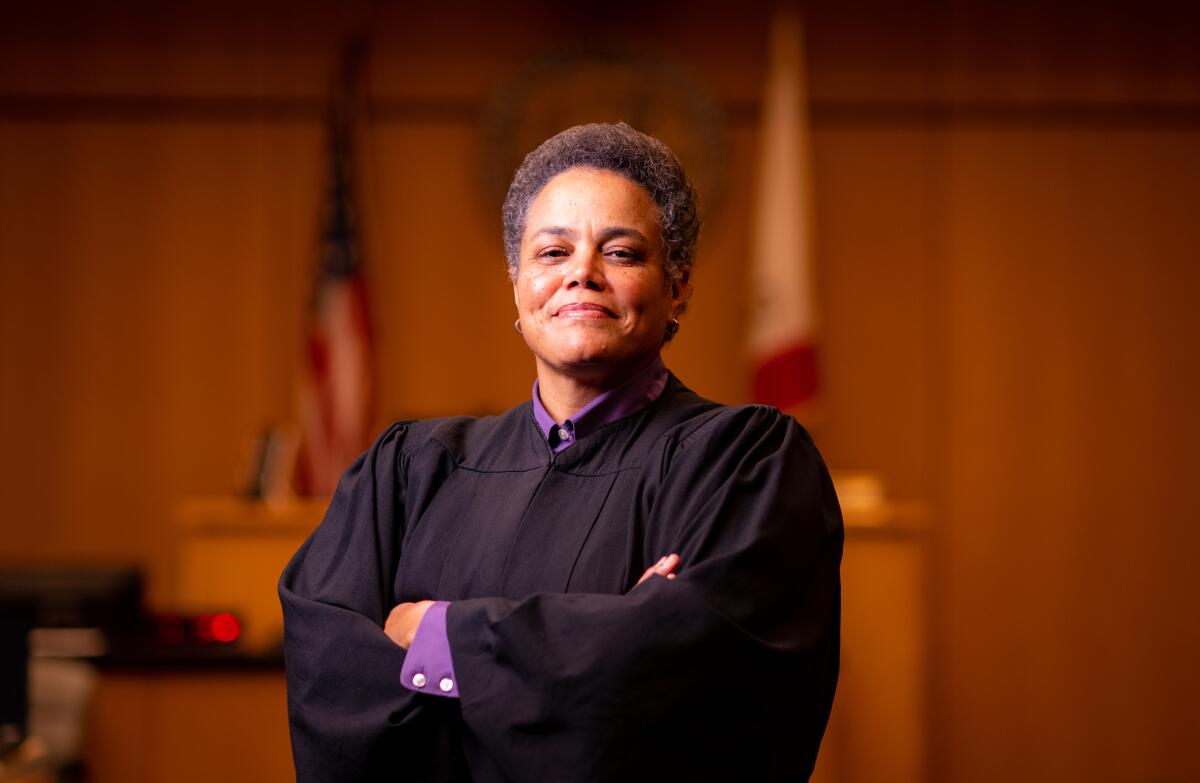Newsom’s pick for California high court seen as consensus builder, LGBTQ history maker

On a recent morning in Alameda County Superior Court, Judge Kelli Evans had a docket many jurists wouldn’t envy — full of civil harassment cases involving litigants who didn’t have lawyers or any firm grasp of the law.
The people before her were seeking restraining orders against neighbors, roommates and former friends. Each had a dramatic story, some more plausible than others. The accusers and the accused, some of whom appeared to be struggling with mental illness, also had vastly different versions of the same events.
Evans did not seem bothered. She listened, tried to understand where each person was coming from, explained the relevant legal issues and cut to the heart of each case to make careful, legally sound decisions, said Tiela Chalmers, chief executive and general counsel of the Alameda County Bar Assn.
“Boy, she was just so good at listening to people,” said Chalmers, who has observed Evans’ career for years and watched the proceedings that day. “She has such a way of carefully listening and steering the conversation to where it needs to go from a legal standpoint.”
It’s a skill set Chalmers and others said has served Evans well as she’s worked through a diverse slate of legal jobs in the nonprofit, private and government sectors. And it’s one they said would continue to benefit her were she to be confirmed as the next associate justice — the first openly lesbian justice — on the California Supreme Court.
Gov. Gavin Newsom put Evans’ name forward earlier this month as his pick to fill the seat Justice Patricia Guerrero is vacating. Newsom nominated Guerrero to become the court’s chief justice after current Chief Justice Tani Cantil-Sakauye announced that she would not be seeking a second term. Guerrero was confirmed Friday and will be on the ballot in November.
The court is known for seeking consensus and reaching decisions unanimously, and Evans would “fit in great” if confirmed, said David Lash, who oversees the global pro bono program at the multinational firm O’Melveny & Myers. Lash has worked with Evans for years, he said, including last year when Evans, then on Newsom’s staff, sought his firm’s help in beating back a legal challenge to the governor’s death penalty moratorium.
“When push comes to shove, if there is no consensus to be built, she’s not shy to make a tough decision,” Lash said. “But she’s going to work really hard to get the most people to the same place as possible.”
Michael Romano, director of the Three Strikes Project at Stanford Law School and chair of a state committee that considers penal code revisions, said Evans has a detailed understanding of the criminal system that is both compassionate and unparalleled among the other sitting justices.
He said he looks forward to Evans using that knowledge to “lead the court toward her vision and experience of justice” in criminal cases, just as he’s seen her do with high-ranking state officials in confidential discussions around criminal justice policy.
“She maybe had the most important voice in those conversations,” Romano said, “because she’s the smartest person in the room on those issues.”
Evans’ appointment comes at a time of intense public scrutiny for the judiciary. The U.S. Supreme Court has recently issued controversial and high-stakes decisions — including on guns and abortion — that have divided the court and the country along partisan lines. Legal experts and those who know Evans well said she would likely have the opposite effect on the California high court, helping it maintain a steadier, less-politicized course.
Evans, 53, has worked as a civil rights attorney. She has held leadership roles in the American Civil Liberties Union of Northern California and no doubt leans liberal, observers said. But she doesn’t do so in an ardently ideological way, they said, and she is unlikely to disrupt the existing cohesion of the already left-of-center California high court.
“I don’t think she’s going to go off on some political lark and frolic. That’s not who she is,” Lash said. “She’s going to follow the law and she’s going to try to be fair and just to all of the people who are impacted by the cases in front of her.”
In an interview with The Times, Evans said she has viewed the law from a young age as a tool for fairness and is “driven fundamentally” by an “abiding belief and commitment to fairness and equal justice under the law.”
She said she would “certainly bring that lens” to her work as a Supreme Court justice.
She said she also would bring her lived experience as a Black lesbian raised in public housing by a grandmother who viewed equal access — to education, to opportunity — as the key to her daughters and granddaughters achieving more.
Encyclopedias to Stanford
Alfreda Onita Cooper, Evans’ grandmother, raised her and her sister because their mother suffered from serious mental illness, Evans said. Cooper had only an eighth-grade education and could never escape working minimum-wage jobs. But she hammered home the importance of education to her daughters and granddaughters and “scrimped and saved” to make sure the family’s home in Denver was always full of books, Evans said.
Cooper arrived home one day with an Encyclopedia Britannica set she had purchased on an installment plan. It ended up costing far more than the books would have if purchased outright, Evans recalled with a laugh.
“She probably paid for those encyclopedias 10 times over,” Evans said, “but I cherished them.”
Evans said she read each volume again and again — she also loved Laura Ingalls Wilder and “A Wrinkle in Time” by Madeleine L’Engle — and soon became the only kid in the neighborhood “more excited by the bookmobile than the ice cream truck.”
Her voracious reading paid off.
Evans said she still remembers arriving at Stanford University in the late 1980s for her freshman year and marveling at the palm trees and the California sunshine.
“I was a kid from Colorado just convinced I had made the right choice,” she said. “I just fell in love with college, and with California.”
Right before her senior year, in the summer of 1990, Evans was playing pool with friends when she met fellow Stanford student — her now wife — Terri Shaw, who was not only good at pool but “whip smart,” Evans said.
The two have been together ever since.
“She’s still my favorite person to talk to,” Evans said.
Law school to the bench
After Stanford, Evans went to UC Davis School of Law and found she was “one of the rare birds” who loved law school, she said.
“I thought it was so intellectually stimulating, so interesting, and I knew that the law could open up opportunities. Not just for me but for other people,” she said.
After graduating, Evans worked as an assistant public defender in Sacramento County, an attorney for the ACLU, a senior trial attorney in the U.S. Justice Department’s Civil Rights Division, and then an associate at a law firm.
From 2003 to 2010, Evans served on a team of federal monitors overseeing the Oakland Police Department — a crash course in the injustices of bad policing — and during that time also started her own private practice.
Along the way, she and Shaw — who is a public health consultant — had a daughter named Kaden, who is now 19 and starting her sophomore year at Northwestern University. They also got married in a rush ceremony at the Alameda County Clerk-Recorder’s Office in Oakland in 2008.
That was just one day before voters approved a ballot initiative that banned same-sex marriage in the state for years to follow. Proposition 8 later was ruled unconstitutional in federal court, and marriages resumed in 2013.
The couple has long lived in Oakland and has two dogs: Jupiter, a 14-year-old black lab who is “very sweet,” and Rocket, a 7-year-old terrier mix who is a “clown.”
Evans loves to cook. One of her favorite dishes, which she first had while studying abroad in Spain during college, is paella. She loves live music and traveling, and the fact that California offers so many different landscapes — forests, deserts, mountains — all within driving distance.
She has close-cropped hair and a wide, easy smile. In conversation she comes across warm but measured. During a Zoom interview, she maneuvered through questions about politics like any seasoned judge — by revealing little and sticking to benign sentiments about deciding cases based on “the rule of law.”
In 2010, Evans returned to the ACLU of Northern California to serve as associate director, where she stayed until 2013. She then worked for the State Bar of California from 2014 to 2017, and as a special assistant to California Atty. Gen. Xavier Becerra from 2017 to 2019.
Evans left Becerra’s office to join Newsom’s staff as chief deputy legal affairs secretary, a job in which Newsom’s office said she advised the governor and executive agencies on a range of legal issues and court cases.
Ann O’Leary, Newsom’s former chief of staff, hired Evans and said her role in moving the administration and the state forward on criminal justice issues could not be overstated.
O’Leary cited Evans’ role in securing passage of Assembly Bill 392, known as “Stephon Clark’s Law.” Clark was killed by Sacramento police in his grandmother’s backyard in 2018 while holding a cellphone.
The law requires that law enforcement use deadly force only when “necessary” and prohibits police from firing on fleeing felons who don’t pose an immediate danger. It was the product of intense negotiations between police reform advocates and police representatives, which Evans steered along with Wayne Bilowit, the governor’s law enforcement liaison.
“It was so powerful to be able to watch Kelli really listen to, and be able to hear, both sides and do so in a way that was really respectful,” O’Leary said.
Last year, Newsom appointed Evans to the bench in Alameda County.
In recent weeks, news of his appointing Evans to the Supreme Court has largely been met with approval in legal circles. UC Berkeley Law School Dean Erwin Chemerinsky praised Evans as “impeccably qualified.” UC Davis Law School Dean Kevin Johnson called her a “brilliant choice.”
Others, however, have raised concerns.
Thomas Saenz, president and general counsel of the Mexican American Legal Defense and Educational Fund, praised Newsom’s elevation of Guerrero to chief justice but criticized him for not backfilling Guerrero’s current seat with another Latino.
Saenz called the fact that there has been only one Latino on the California Supreme Court at a time an “inexplicable limitation,” given that Latinos represent the largest racial group in the state, and said Newsom had “perpetuated” that limitation by picking Evans.
Others have criticized Newsom for seating Evans through appointment rather than nomination, delaying the time at which she’ll have to be approved by voters until 2026. Newsom’s office has rejected that criticism, saying the appointment is legally proper.
Making history
Among the many who cheered Evans’ pending appointment was the state’s largest LGBTQ rights organization, Equality California.
Tony Hoang, the group’s executive director, said anti-gay forces in the country are fighting to legislate new forms of discrimination against the LGBTQ community — and particularly the transgender community — and “having someone like Judge Evans on the California Supreme Court really shows how we can push back against that rhetoric.”
Evans would be the second Black LGBTQ justice on the court, after Justice Martin Jenkins, who is gay. Jenkins also was appointed by Newsom.
Asked about the historic nature of her appointment, Evans said she agreed representation is important, particularly amid rising hate crimes and “legislative setbacks” for the LGBTQ community in other states.
“Young people in other states have been told that they and their families are not valued. Folks are being told they can’t say ‘gay,’” Evans said, referring to a Florida law restricting discussions about sexual orientation or gender identity in schools.
Evans said her appointment would tell those same kids and families that “you can be out, you can live your authentic life and thrive personally and professionally at the highest levels.”
While her LGBTQ identity will not define her actions on the court, it will be one of the many things that brings diversity to the bench, she said — which makes it critical.
Diversity among decision-makers not only shapes the way problems are framed and interpreted, Evans said, but the “inferences that are drawn” and the solutions that are proposed.
In that way, she said, “diversity and representation helps improve decision-making.”
The work ahead
Evans said she is excited — and ready — to do the work of an associate justice. She’s particularly excited about getting the chance, one day, to write opinions for the court.
Evans said she believes in finding common ground, and that unanimous decisions — like those the high court is known for — do lend “a certain gravitas or legitimacy” to rulings that isn’t necessarily there in split decisions.
That said, her “primary goal” as one of the court’s seven justices would be “to do all that I can to reach the right decision in every single case before me based on the law and the facts,” and nothing else, she said.
Chalmers, of the Alameda County Bar, said she has no doubt Evans will be fair.
Chalmers worked with Evans when Evans was at the State Bar and helped oversee funding for legal aid services around the state. Chalmers was a consultant for some of those groups at the time, and she and Evans would regularly disagree, she said.
Chalmers recalled one dispute over the amount of data legal aid bureaus were required to collect in exchange for state funding. Chalmers believed the requirements were onerous and took time away from serving clients. Evans, she said, commiserated but held firm, going into great detail about the usefulness of the data in getting lawmakers to appreciate the bureaus’ work and fund them robustly.
Evans is incredibly smart, Chalmers said, the rare sort of person who can see and synthesize a dozen relevant legal issues where others only see a few.
Lash, of O’Melveny & Myers, agreed.
He said Evans is not only “laser focused on making sure that the judicial system works for the people who need it the most,” but unusually skilled at identifying how the system has failed them — and then finding solutions.
It’s just the kind of mind, he said, the high court needs.
More to Read
Sign up for Essential California
The most important California stories and recommendations in your inbox every morning.
You may occasionally receive promotional content from the Los Angeles Times.











